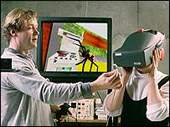Military Web sites offered adversaries a potent instrument to use an unprecedented volume of information.
Published:
17 February 1999 y., Wednesday
The chairman of the Joint Chiefs of Staff looked on as Pentagon cyber-warriors clicked away at their laptops and showed how would-be terrorists could find his son_s home address. Army Gen. Henry Shelton then got a demonstration of how a skilled adversary might combine publicly available biographies and contractor information on military Web sites with a few well-placed phone calls to pin down the dates of highly classified nuclear exercises. The classified briefing, held in Shelton_s entagon office, was then given to other generals and admirals as well as senior civilians, generating a momentum that has led the military to order a massive scrub of its vast network of Internet sites. Deputy Defense Secretary J. Hamre said military Web sites offered adversaries 'a potent instrument to obtain, correlate and evaluate an unprecedented volume of aggregated information' that could, when combined with other sources of information, 'endanger Department of Defense personnel and their families.' Instituted Dec. 7, the policy change has touched off a debate as some critics argue the Pentagon went too far in restricting the information it makes public on the Internet. In response, defense and national security officials have become more willing to discuss, on condition of not being identified by name, the nature of the risk their detailed review of military Web sites revealed. The briefings stemmed from work done in 1997 and 1998 by Pentagon 'red teams,' a term associated with a notional enemy force in war games. Team members tried to learn how much mischief they could do by skillfully scanning military Web sites, without any sophisticated hacking. The red teams found detailed maps and aerial photographs of military installations that would help anyone planning a strike or a terrorist action. These were the kinds of pictures, one senior official noted ruefully, that the United States spent billions to get during the Cold War through its spy satellite network. Now the United States was giving such imagery away for free on the Internet. The Pentagon says it has solid electronic evidence that foreign countries, including some adversaries, are regular visitors to U.S. military Web sites.
Šaltinis:
AP
Copying, publishing, announcing any information from the News.lt portal without written permission of News.lt editorial office is prohibited.
The most popular articles
Software company announced new structure_ of it_s business.
more »
 Microsoft's Bing search engine will be the sole provider of search and paid search technology for all of Yahoo's websites. Yahoo will sell premium search ads for both companies.
more »
Microsoft's Bing search engine will be the sole provider of search and paid search technology for all of Yahoo's websites. Yahoo will sell premium search ads for both companies.
more »
 Thales UK today announces that its Cat III Instrument Landing System (ILS)1 has received UK approval for installation at Bournemouth Airport.
more »
Thales UK today announces that its Cat III Instrument Landing System (ILS)1 has received UK approval for installation at Bournemouth Airport.
more »
 Postbank customers can now pay their fuel bills at Shell service stations and withdraw cash as stations in Hamburg, Germany, have been converted to the new technology from Wincor Nixdorf International.
more »
Postbank customers can now pay their fuel bills at Shell service stations and withdraw cash as stations in Hamburg, Germany, have been converted to the new technology from Wincor Nixdorf International.
more »
 Japanese company Crescent has simulated a series of emergency situations that people may have to deal with in the workplace. By practicing with these simulations they can learn how to cope with a real-life crisis.
more »
Japanese company Crescent has simulated a series of emergency situations that people may have to deal with in the workplace. By practicing with these simulations they can learn how to cope with a real-life crisis.
more »
 The touchscreen device built on Google's Android platform equates to a bold attempt by HTC to take on Apple's popular iPhone - not by creating a copycat - but by building an attractive alternative.
more »
The touchscreen device built on Google's Android platform equates to a bold attempt by HTC to take on Apple's popular iPhone - not by creating a copycat - but by building an attractive alternative.
more »
 A devious piece of criminal coding that has been quietly at work in a clutch of ATMs at banks in Russia and Ukraine has recently been discovered.
more »
A devious piece of criminal coding that has been quietly at work in a clutch of ATMs at banks in Russia and Ukraine has recently been discovered.
more »
 In the person-to-person transfer business, text messaging is so 2008.
more »
In the person-to-person transfer business, text messaging is so 2008.
more »
 Bank Central Asia, one of Indonesia's largest banks, has partnered with Wincor Nixdorf International to rejuvenate its branch network.
more »
Bank Central Asia, one of Indonesia's largest banks, has partnered with Wincor Nixdorf International to rejuvenate its branch network.
more »
 What's cooking at Tokyo's International Food Machinery and Technology Expo? For this robo-chef, it's okonomiaki, Japanese pancakes.
more »
What's cooking at Tokyo's International Food Machinery and Technology Expo? For this robo-chef, it's okonomiaki, Japanese pancakes.
more »
 Taking attendance at Aoyama University used to be a chore, but no longer as the Japanese school is giving over 500 iPhones to students and faculty in an effort to enhance the classroom experience.
more »
Taking attendance at Aoyama University used to be a chore, but no longer as the Japanese school is giving over 500 iPhones to students and faculty in an effort to enhance the classroom experience.
more »